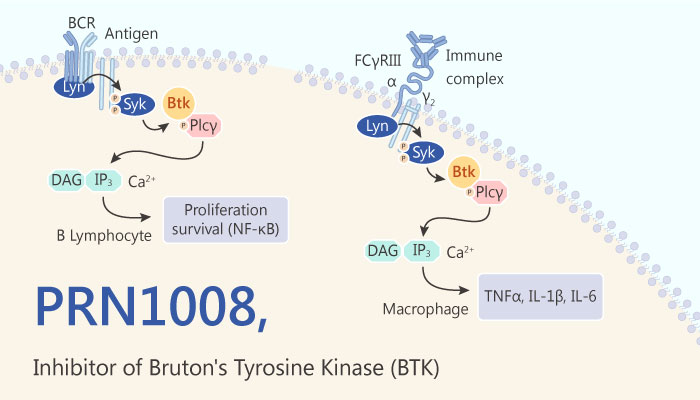Bruton’s tyrosine kinase (BTK) is a nonreceptor tyrosine kinase in human encoded by BTK gene. Besides, the kinase belongs to the TEC protein tyrosine kinase family of kinases. Additionally, this kind of tyrosine kinase plays a crucial role in B cell maturation as well as mast cell activation through the high-affinity IgE receptor. Other haematopoietic cells include in basophils, mast cells, macrophages, neutrophils and platelets. Furthermore, emerging studies have verified the effect of BTK inhibitors in various cancers. Among which, Acalabrutinib, approved in October 2017, has been used in the treatment of relapsed Mantle Cell Lymphoma. ONO-4059, a drug in Phase I trials, was strong effective for relapsed CLL.

PRN1008, a selective BTK inhibitor, reported by Patrick F. Smith, et al has entered into clinical Phase I trials since 2016. Moreover, the BTK inhibitor showed safety following oral administration. And it achieved high, sustained levels of BTK occupancy in peripheral blood mononuclear cells. Not only that, but also in preclinical experiments, the selective compound is identified as a reversible covalent inhibitor of BTK, with an IC50 of 1.3±0.5 nM. And it is also found to be highly selectively when tested in a panel of 251 other kinases. Treatment of this compound inhibited anti-IgM induces human B cell proliferation (10% serum) and B cell CD69 expression, with IC50s of 5±2.4 nM and 123±38 nM, respectively.
In animal models, the potent inhibitor showed sustained efficacy after the compound was cleared out from circulation, consistent with the extended target residence time. In addition, the oral active drug also reverses and completely inhibits collagen-induced rat arthritis in a dose-dependent manner.